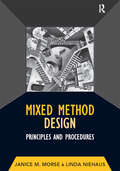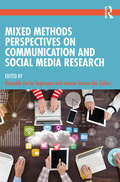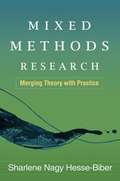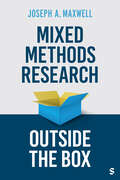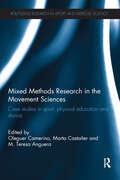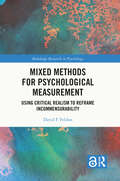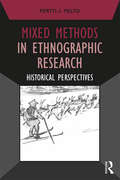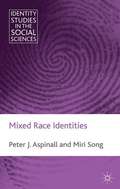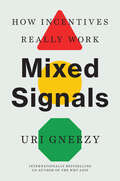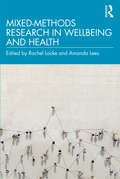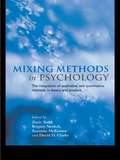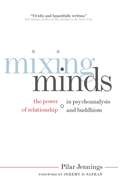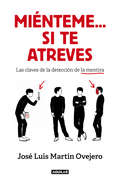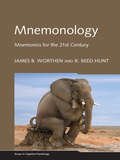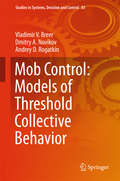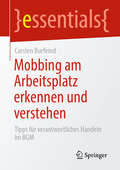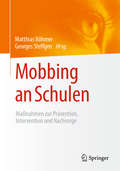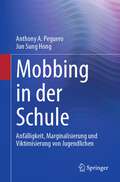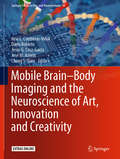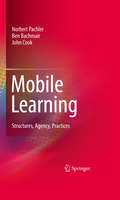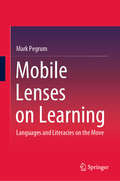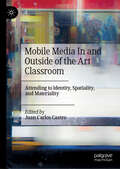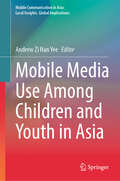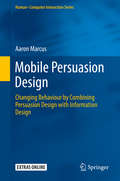- Table View
- List View
Mixed Method Design: Principles and Procedures (ISSN)
by Janice M MorseThe use of mixed methods designs for conducting research has become a major trend in social science research. Renowned methodological experts Janice Morse and Linda Niehaus present a guide to intermediate and experienced researchers on the possibilities inherent in mixed method research. They offer the basic principles of conducting this kind of study, then examine a wide variety of design options available to the researcher, including their strengths and weaknesses and when to use them. Providing examples from a variety of disciplines, examining potential threats to validity, and showing the relationship between method and theory, the book will be a valuable addition to the methodologist’s library and a useful text in courses in research design.
Mixed Methods Perspectives on Communication and Social Media Research
by Reynaldo Gacho SegumpanMixed Methods Perspectives on Communication and Social Media Research addresses the need for a discipline-cum-methodology-tailored book that navigates the current research spectrum of communication and social media ("CommSocMed"). It examines contemporary and relevant issues that intertwine the expansive spheres of CommSocMed. Authored by professionals with extensive academic and in-depth research and industry experience, the book highlights research-based themes that mirror qualitative and quantitative methodologies vis-à-vis socio-cultural, political, educational, and organisational issues and challenges. The first two sections present the mutually interwoven disciplines of CommSocMed where research works cover a comprehensive range of designs such as narrative analysis, case study, recombinant memetics, discourse analysis, visual semiotics, ethnography, content analysis, feminist theory, descriptive-survey, descriptive-correlational, model-building/testing, experimental, and mixed methods. The third section is a concluding segment which synthesises all the scholarly contributions in this volume. This book will serve as an authoritative reference for mixed methods research in CommSocMed and will be highly relevant reading for academics, researchers, postgraduate students and undergraduates in communication (for example, instructional communication, marketing communication, organisational communication, political communication, strategic communication), social media, and social sciences.
Mixed Methods Research
by Sharlene Hesse-BiberThis accessibly written book is ideal for use in graduate courses or by practicing researchers and evaluators. The author puts the research problem at center stage, showing how mixed methods designs can fruitfully address different types of research questions. She illustrates the discussion with examples of mixed methods studies from a variety of disciplines and qualitative approaches (interpretative, feminist, and postmodern). The text demonstrates how to navigate ethical issues; gather, analyze, and interpret data; and write up the results, including an in-depth example with step-by-step commentary. Special features include "researcher standpoint" reflections from leading scholars and practical strategies to help users develop their own research perspectives. Every chapter concludes with a glossary, discussion questions, and useful Web resources.
Mixed Methods Research Outside the Box
by Joseph A. Maxwell Inc. Sage PublicationsIn Mixed Methods Research Outside the Box, Joseph A. Maxwell shows readers how to carry out unconventional, yet effective, mixed methods research. Providing a new way to think about and combine qualitative and quantitative research, this readable text takes a broad view of mixed methods, revealing the largely unrecognized early history of mixed methods research and its current diversity across disciplines. Maxwell brings together work on combining qualitative and quantitative methods from a variety of disciplines and puts them in conversation with one another. He identifies mixed methods’ philosophical bases, presenting an "interactive" model of design that more closely integrates qualitative and quantitative elements and emphasizes the complementarity of qualitative and quantitative methods for understanding causation and generalization. Drawing from recent works on causation, integration, and philosophy of science, this text promotes innovations in mixed methods, such as process tracing in political science and design-based research in education. This groundbreaking book provides readers with a new way of thinking about, developing, and conducting mixed methods research.
Mixed Methods Research Outside the Box
by Joseph A. Maxwell Inc. Sage PublicationsIn Mixed Methods Research Outside the Box, Joseph A. Maxwell shows readers how to carry out unconventional, yet effective, mixed methods research. Providing a new way to think about and combine qualitative and quantitative research, this readable text takes a broad view of mixed methods, revealing the largely unrecognized early history of mixed methods research and its current diversity across disciplines. Maxwell brings together work on combining qualitative and quantitative methods from a variety of disciplines and puts them in conversation with one another. He identifies mixed methods’ philosophical bases, presenting an "interactive" model of design that more closely integrates qualitative and quantitative elements and emphasizes the complementarity of qualitative and quantitative methods for understanding causation and generalization. Drawing from recent works on causation, integration, and philosophy of science, this text promotes innovations in mixed methods, such as process tracing in political science and design-based research in education. This groundbreaking book provides readers with a new way of thinking about, developing, and conducting mixed methods research.
Mixed Methods Research in the Movement Sciences: Case Studies in Sport, Physical Education and Dance (Routledge Research in Sport and Exercise Science)
by Oleguer Camerino Marta Castañer M. Teresa AngueraMixed methods research techniques, combining both quantitative and qualitative elements, have become well established throughout the social, behavioural and natural sciences. This is the first book to focus on the application of mixed methods research in the movement sciences, specifically in sport, physical education and dance. Researchers and practitioners in each of these fields are concerned with the study of habitual behaviour in naturalistic contexts, and of the concurrent and sequential nature of events and states, precisely the kind of work that multi-method research design can help illuminate. The book is arranged into four sections. The first provides a thorough overview of mixed methods procedures and research design, and summarizes their applicability to the movement sciences. The remaining sections then offer detailed case studies of mixed methods research in team and individual sports (analyzing hidden patterns of play and optimising technique); kinesics and dance (analyzing motor skills behaviour in childhood, and the complexity of motor responses in dance); and physical education (detecting interaction patterns in group situations, and optimizing non-verbal communication by teachers and sports coaches). Mixed Methods Research in the Movement Sciences offers an important new tool for researchers and helps to close the gap between the analysis of expert performance and our understanding of the general principles of movement science. It is important reading for any student, researcher or professional with an interest in motor control, sport and dance pedagogy, coaching, performance analysis or decision-making in sport.
Mixed Methods for Psychological Measurement: Using Critical Realism to Reframe Incommensurability (Routledge Research in Psychology)
by David F. FeldonThis book presents a groundbreaking approach to measurement from a mixed methodological perspective, reframing the concept of incommensurability to harmonize qualitative and quantitative data in analyses.It draws upon critical realism, latent variable theory, and phenomenography to illustrate how idiographic data can be incorporated into the development and validation of psychological measures. The text delves into foundational methodological assumptions, explores item and instrument validation techniques, and addresses issues of invariance. It further elucidates the application of idiographic strategies in conjunction with differential item function (DIF), item parameter drift (IPD), latent growth models, and the evaluation of measurement models. This innovative framework offers researchers robust tools for integrating diverse data types, enhancing the validity and reliability of their findings, and articulates ways in which these tools can be integrated into critical quantitative perspectives. It is an invaluable resource for anyone seeking to deepen their understanding of mixed methodologies and measurement.It will appeal to scholars, researchers, and students whose goals are to integrate different modes of data, examine alternative perspectives on measurement, and apply new tools to psychological and social research.
Mixed Methods in Ethnographic Research: Historical Perspectives (Developing Qualitative Inquiry)
by Pertti J. PeltoMixed Methods in Ethnographic Research: Historical Perspectives captures the dynamic history and development of mixed methods research in a narrative of personal discovery, growth, and experience. Distinguished ethnographer and methodologist Pertti Pelto, who first called for the integration of qualitative and quantitative research methods nearly half a century ago, establishes a direct line between the earliest examples of ethnographic research and the ongoing mixed method discussions in academic institutions throughout the world. By bringing together such distinct historical perspectives with his own reflections on mixed methods research, Pelto offers a rare and endlessly enriching account that will satisfy the ever-growing need for a better quality of practical data gathering and give researchers a foundation for promoting mixed methods in the future.
Mixed Race Identities
by Miri Song Peter J. AspinallThis book explores the ethnic and racial options exercised by young mixed race people in Britain. It reveals the diverse ways in which young people identify and experience their mixed status, the complex nature of such identities, and the rise of other identity strands which are now challenging race and ethnicity as dominant and salient identities.
Mixed Signals: How Incentives Really Work
by Uri GneezyAn informative and entertaining account of how actions send signals that shape behaviors and how to design better incentives for better results in our life, our work, and our world Incentives send powerful signals that aim to influence behavior. But often there is a conflict between what we say and what we do in response to these incentives. The result: mixed signals. Consider the CEO who urges teamwork but designs incentives for individual success, who invites innovation but punishes failure, who emphasizes quality but pays for quantity. Employing real-world scenarios just like this to illustrate this everyday phenomenon, behavioral economist Uri Gneezy explains why incentives often fail and demonstrates how the right incentives can change behavior by aligning with signals for better results. Drawing on behavioral economics, game theory, psychology, and fieldwork, Gneezy outlines how to be incentive smart, designing rewards that are simple and effective. He highlights how the right combination of economic and psychological incentives can encourage people to drive more fuel-efficient cars, be more innovative at work, and even get to the gym. &“Incentives send a signal,&” Gneezy writes, &“and your objective is to make sure this signal is aligned with your goals.&”
Mixed-Methods Research in Wellbeing and Health
by Rachel Locke Amanda LeesMixed-Methods Research in Wellbeing and Health brings together nine examples of high-quality research into wellbeing and health using a range of mixed methods. Research that employs mixed methods can yield robust data that is both more reliable and valid than that arising from a single-method approach. Mixed-methods research is a vital component in responding to recent changes to the more complex needs of an increasingly diverse society and its health sector. This book covers how mixed-methods research can be designed creatively and applied sensitively in the context of wellbeing and health research. The editors have included a set of bespoke questions for reflection at the end of each chapter. The expert editorial commentary highlights the benefits and methodological challenges of mixed-methods research as well as ‘thinking points’ for researchers as they plan and carry out mixed-methods research on wellbeing and health topics. Within a holistic view of wellbeing and health, the mixed-methods research designs are applied appropriately in both practice and community settings. The research can be shaped by pragmatism and the actual needs of a study rather than purely theoretical considerations. This practical book makes high-quality, mixed-methods research design and execution guidance readily accessible to health-care practitioners and researchers working in the fields of health, social care and wellbeing services and to undergraduate and postgraduate students in courses in research and health-care studies, as well as health management.
Mixing Methods in Psychology: The Integration of Qualitative and Quantitative Methods in Theory and Practice
by Brigitte Nerlich Zazie Todd Suzanne McKeowan David D. ClarkeCan qualitative and quantitative methods be combined effectively in psychology? What are the practical and theoretical issues involved? Should different criteria be used to judge qualitative and quantitative research?The acceptance of qualitative research methods in psychology has lead to a split between qualitative and quantitative methods and has raised questions about how best to assess the validity of research practice. While the two approaches have traditionally been seen as competing paradigms, more recently, researchers have begun to argue that the divide is artificial.Mixing Methods in Psychology looks in detail at the problems involved in attempting to reconcile qualitative and quantitative methods both within and across subjects. All angles of the debate are discussed, covering areas asdiverse as health, education, social, clinical and economic psychology. The contributors, who are some of the leading figures in the field, present theoretical and methodological guidance as well as practical examples of how quantitative and qualitative methods can be fruitfully combined. By aiming to bridge the gap between the two methods, this book reveals how each can inform the other to produce more accurate theories and models of human behaviour.This groundbreaking text will be essential reading for students and researchers wishing to combine methods, or for anyone who simply wants to get a better understanding of the debate.
Mixing Minds
by Jeremy D. Safran Pilar Jennings"We cannot find ourselves, or be ourselves, alone." - from Mixing Minds Mixing Minds explores the interpersonal relationships between psychoanalysts and their patients, and Buddhist teachers and their students. Through the author's own personal journey in both traditions, she sheds light on how these contrasting approaches to wellness affect our most intimate relationships. These dynamic relationships provide us with keen insight into the emotional ups and downs of our lives - from fear and anxiety to love, compassion, and equanimity. Mixing Minds delves into the most intimate of relationships and shows us how these relationships are the key to the realization of our true selves.
Miénteme... si te atreves: Claves para detectar la mentira y potenciar tu credibilidad
by José Luis Martín Ovejero«Yo no he sido», «no pasa nada», «te lo juro»... Los humanos mentimos y con frecuencia. En este libro, el experto en comunicación no verbal JOSÉ LUIS MARTÍN OVEJEROte da las claves para que la próxima vez que lo intenten puedas estar alerta. ¿Quieres descubrir las las señales de la mentira? No te dejes engañar. ¡Vive con ventaja! Cuando las personas mienten o no confían en lo que cuentan, se comunican de manera diferente y tanto su lenguaje como su cuerpo pueden delatarlas. Lo mejor de todo es que no son conscientes, no lo pueden evitar. Sin la preparación adecuada, nuestra capacidad de detectar la falta de honestidad es puro azar. Conocer los indicadores concretos de engaño y la detección de la mentira es fundamental a la hora de elevar los índices de éxito en esta misión. Y el propósito de este libro es que puedas identificarlos. No importa tu profesión, saber cuándo alguien miente puede resultarte de gran utilidad en todas las facetas de tu vida. Los lectores han dicho de Tú habla, que yo te leo:«Con ilustraciones, imágenes de personajes relevantes de distintos ámbitos y escrito de una manera conversacional, parece que estás asistiendo a una de sus clases y que te lo está explicando solo a ti». «Definitivamente, José Luis Martín Ovejero ha creado un gran libro que consigue engancharte desde el principio». «Un libro magnífico pero, sobre todo, una herramienta perfecta para dejar de caminar "a ciegas" en la vida. Me dedico a los RRHH y a la comunicación, por lo que este libro se convierte, para mí, en un auténtico tesoro». «Un imprescindible para leer lo que los demás no te dicen con palabras».
Mnemonology: Mnemonics for the 21st Century (Essays in Cognitive Psychology)
by James B. Worthen R. Reed HuntThis book bridges the gap between basic memory research and mnemonic applications through a careful analysis of the processes that underlie effective memory aids. The book traces the history of mnemonics, examines popular techniques, and discusses the current relevance of mnemonics to both psychological researchers and those seeking to improve their memory. Using a unique approach (termed "mnemonology"), the authors seek not necessarily to promote specific mnemonic techniques, but to provide information which will allow one to improve memory by creating their own mnemonics.
Mob Control: Models of Threshold Collective Behavior
by Vladimir V. Breer Dmitry A. Novikov Andrey D. RogatkinThis book presents mathematical models of mob control with threshold (conformity) collective decision-making of the agents. Based on the results of analysis of the interconnection between the micro- and macromodels of active network structures, it considers the static (deterministic, stochastic and game-theoretic) and dynamic (discrete- and continuous-time) models of mob control, and highlights models of informational confrontation. Many of the results are applicable not only to mob control problems, but also to control problems arising in social groups, online social networks, etc. Aimed at researchers and practitioners, it is also a valuable resource for undergraduate and postgraduate students as well as doctoral candidates specializing in the field of collective behavior modeling.
Mobbing am Arbeitsplatz erkennen und verstehen: Tipps für verantwortliches Handeln im BGM (essentials)
by Carsten BurfeindIn diesem essential gibt Carsten Burfeind einen Überblick über alle relevanten Aspekte des komplexen Geschehens „Mobbing am Arbeitsplatz“. Es wird deutlich, dass die Reduktion psychischer Belastungen die beste Mobbingprävention darstellt, denn Stress fördert Mobbing und Mobbing stresst, und dass der Schutz der Betroffenen Vorrang vor anderen betrieblichen Maßnahmen hat. Das Buch enthält Tipps und Hinweise für verantwortliches Handeln im konkreten Mobbingfall und gibt den Leserinnen und Lesern Handlungsempfehlungen für eine betriebliche Konflikt- und Mobbingprävention.
Mobbing an Schulen: Maßnahmen zur Prävention, Intervention und Nachsorge
by Matthias Böhmer Georges SteffgenMobbing stellt an Schulen ein weit verbreitetes Problem dar. Dieses Buch liefert zum einen aktuelle Erklärungsansätze für das Phänomen Mobbing an Schulen. Es wird aufgezeigt, dass Mobbing nicht nur zwischen Opfern und Tätern stattfindet, sondern dass in der Regel alle Mitglieder einer Schulklasse beteiligt sein können. Entsprechend wird beschrieben, welche Folgen Mobbing für alle Beteiligte haben kann. Zum anderen werden allgemeine Präventions- und Interventionsansätze beschrieben sowie elf Anti-Mobbing-Programme detailliert vorgestellt. Einen besonderen Fokus richtet das Buch auf Mobbingnachsorgekonzepte sowie praxisbezogene Exkurse von ausgewiesenen Experten.
Mobbing in der Schule: Anfälligkeit, Marginalisierung und Viktimisierung von Jugendlichen
by Anthony A. Peguero Jun Sung HongDieses Buch untersucht die damit verbundenen Erfahrungen mit Mobbing und Gewalt in der Schule bei gefährdeten und marginalisierten Jugendlichen. Es erörtert die Auswirkungen von Diversität und Ungleichheiten in den Erfahrungen von Jugendlichen mit Mobbing. Dazu gehören sozioökonomischer und sozialer Status, familiärer Zusammenhalt und Interaktionen, Geschlecht, sexuelle Orientierung, Geschlechtsidentität und -ausdruck, Rasse, ethnische Zugehörigkeit, Einwanderung, Religion sowie Behinderungen und besondere gesundheitliche Bedürfnisse. Das Buch beschreibt die Art und Weise, wie ein sozial-ökologischer Rahmen über das Problem informieren und Mobbing an Schulen angehen kann. Es befasst sich nicht nur mit den individuellen, intrapersonellen und umweltbedingten Faktoren von Mobbing, sondern erörtert auch Faktoren auf der distalen Ebene und Bedingungen, die speziell fürJugendliche relevant sind (z. B. Kultur und Recht). Darüber hinaus kontextualisiert dieser Band relevante Mehrebenenfaktoren, die die Viktimisierung durch Mobbing bei gefährdeten und historisch marginalisierten Kindern und Jugendlichen, die mit einer kumulativen sozialen Schichtung konfrontiert sind, fördern oder verhindern.Zu den wichtigsten Themenbereichen gehören:· Die Rolle der Familie (Eltern und Erziehungsberechtigte, Geschwister) - ihr Zusammenhalt und ihre Interaktionen - bei Mobbing in der Schule.· Rasse, ethnische Zugehörigkeit, Einwanderung und Religion sowie Mobbing in der Schule bei marginalisierten und gefährdeten Jugendlichen.· Viktimisierung von Schülern mit körperlichen, emotionalen und Lernstörungen.· Mobbing und Viktimisierung gefährdeter Jugendlicher in den Gerichtssystemen.Mobbing in der Schule ist ein unverzichtbares Hilfsmittel für Forscher, Kliniker und andere Praktiker, Studenten und politische Entscheidungsträger in Disziplinen wie Kinder- und Schulpsychologie, Sozialarbeit und Beratung, Pädiatrie und Schulpflege, Bildungspolitik und Politik sowie in allen miteinander verbundenen Disziplinen.
Mobile Brain-Body Imaging and the Neuroscience of Art, Innovation and Creativity (Springer Series on Bio- and Neurosystems #10)
by Jose L. Contreras-Vidal Chang S. Nam Dario Robleto Jesus G. Cruz-Garza José M. AzorínMobile Brain–Body Imaging and the Neuroscience of Art, Innovation and Creativity is a trans-disciplinary, collective, multimedia collaboration that critically uncovers the challenges and opportunities for transformational and innovative research and performance at the nexus of art, science and engineering. This book addresses a set of universal and timeless questions with a profound impact on the human condition: How do the creative arts and aesthetic experiences engage the brain and mind and promote innovation?How do arts–science collaborations employ aesthetics as a means of problem-solving and thereby create meaning?How can the creative arts and neuroscience advance understanding of individuality and social cognition, improve health and promote life-long learning?How are neurotechnologies changing science and artistic expression?How are the arts and citizen science innovating neuroscience studies, informal learning and outreach in the public sphere?Emerging from the 2016 and 2017 International Conferences on Mobile Brain–Body Imaging and the Neuroscience of Art, Innovation and Creativity held in Cancun, Mexico and Valencia, Spain to explore these topics, this book intertwines disciplines and investigates not only their individual products—art and data—but also something more substantive and unique; the international pool of contributors reveals something larger about humanity by revealing the state of the art in collaboration between arts and sciences and providing an investigational roadmap projected from recent advances.Mobile Brain–Body Imaging and the Neuroscience of Art, Innovation and Creativity is written for academic researchers, professionals working in industrial and clinical centers, independent researchers and artists from the performing arts, and other readers interested in understanding emergent innovations at the nexus of art, science, engineering, medicine and the humanities. The book contains language, design features (illustrations, diagrams) to develop a conversational bridge between the disciplines involved supplemented by access to video, artistic presentations and the results of a hackathon from the MoBI conferences.
Mobile Learning
by Gunther Kress Norbert Pachler Ben Bachmair John CookAs with television and computers before it, today's mobile technology challenges educators to respond and ensure their work is relevant to students. What's changed is that this portable, cross-contextual way of engaging with the world is driving a more proactive approach to learning on the part of young people. The first full-length authored treatment of the relationship between the centrality of technological development in daily life and its potential as a means of education, Mobile Learning charts the rapid emergence of new forms of mass communication and their potential for gathering, shaping, and analyzing information, studying their transformative capability and learning potential in the contexts of school and socio-cultural change. The focus is on mobile/cell phones, PDAs, and to a lesser extent gaming devices and music players, not as "the next new thing" but meaningfully integrated into education, without objectifying the devices or technology itself. And the book fully grounds readers by offering theoretical and conceptual models, an analytical framework for understanding the issues, recommendations for specialized resources, and practical examples of mobile learning in formal as well as informal educational settings, particularly with at-risk students. Among the topics covered: * Core issues in mobile learning * Mobile devices as educational resources * Socioeconomic approaches to mobile learning * Creating situations that promote mobile learning * Ubiquitous mobility and its implications for pedagogy * Bridging the digital divide at the policy level Mobile Learning is a groundbreaking volume, sure to stimulate both discussion and innovation among educational professionals interested in technology in the context of teaching and learning.
Mobile Lenses on Learning: Languages and Literacies on the Move
by Mark PegrumThis book explores mobile learning as a form of learning particularly suited to our ever more mobile world, presenting a new conceptualisation of the value of mobile devices in education through the metaphor of lenses on learning. With a principal focus on mobile-assisted language learning (MALL), it draws on insights derived from MALL language, literacy and cultural projects to illustrate the possibilities inherent in all mobile learning.In its broad sweep the book takes in new and emerging technologies and tools from robots to holograms, virtual reality to augmented reality, and smart glasses to embeddable chips, considering their potential impact on education and, indeed, on human society and the planet as a whole. While not shying away from discussing the risks, it demonstrates that, handled appropriately, mobile, context-aware technologies allow educators to build on the personalised and collaborative learning facilitated by web 2.0 and social media, but simultaneously to go much further in promoting authentic learning experiences grounded in real-world encounters. In this way, teachers can better prepare students to face a global, mobile future, with all of its evolving possibilities and challenges.
Mobile Media In and Outside of the Art Classroom: Attending to Identity, Spatiality, and Materiality
by Juan Carlos CastroThis edited volume explores a range of educational effects on student learning that resulted from a long-term study using a creative visual arts curriculum designed for mobile media (smartphones and tablets) and used in art classrooms. The curriculum, entitled MonCoin, a French phrase meaning My Corner, was initially designed and piloted in a Montreal area school for at-risk youth in 2012. Since then, it has been refined, deployed, and researched across secondary schools from a range of socio-cultural educational contexts. This book is comprised of contributions from researchers and practitioners associated with the MonCoin project who address critical insights gleaned from our study, such as the social context of teen mobile media use; curriculum theory and design; influences of identity on creative practice; and specific strategies for creative applications of mobile media in schools. The purpose of this edited book is to offer art education researchers and teachers innovative curriculum for mobile media and the networked conditions that influence identity, space, and practice with and through this ubiquitous technology.
Mobile Media Use Among Children and Youth in Asia (Mobile Communication in Asia: Local Insights, Global Implications)
by Andrew Zi Han YeeThis book examines mobile media use among children and youths within an Asian context. By studying the impact of mobile media on children and youth in Asia, it focuses on the explosive growth of mobile media among young people and seeks to understand the potential consequences of mobile media use on society, relationships, and what it means to be a young person. With this, it provides a richly contextualized Asian voice to research on mobile media and young people, enriching the global conversation surrounding an increasingly central aspect of youths’ everyday lives. Research on mobile media and its impact on children and youths in Asia is not thoroughly represented, despite the proliferation of smartphone and tablet use in the region. This volume fills this gap by canvassing contemporary research on mobile media, children, and youth in Asia through the perspectives of emerging scholars in the region and beyond. It promotes an understanding of the motivations and patterns of use by children and youth in the region, examines contemporary research on the antecedents and consequences of mobile media use on society, relationships, and the individual, and provides a critique of mobile media use among children and youth. The volume also provides a culturally sensitive examination of mobile media use among children and youth, describing and analyzing policies enacted to manage young people’s smartphone use. It acknowledges Asia as a large and diverse region with differing linguistic, cultural, and sociopolitical traditions and contexts, and so the work does, as far as possible, look to ensure geographic and cultural diversity by prioritizing works from countries that are typically underrepresented. It is a relevant text to graduates and researchers in communication and media studies, social and developmental psychology, human development studies, science and technology, information systems, and design science.
Mobile Persuasion Design
by Aaron MarcusMobile Persuasion Design presents ten conceptual design projects (or 'Machines') for new mobile application's (smartphone or tablet with Web portals) that combine theories of persuasion and information design to change people's behaviour. Areas such as the environment, health, learning and happiness are explored, looking at ways of marrying people's wants and needs to make simple, usable and desirable mobile applications. A user-centred design approach has been used, adopting user experience (UX) methods, in-depth case studies and market analysis to see what a modern user needs from their mobile application. By applying concepts like persuasion theory and information architecture, try to find ways to satisfy these needs and positively change their user habits. In 2011, the Green, Health, and Money Machines won design awards in an international competition hosted by the International Institute for Information Design, Vienna.
